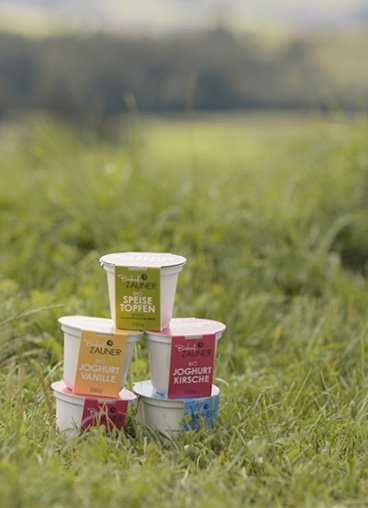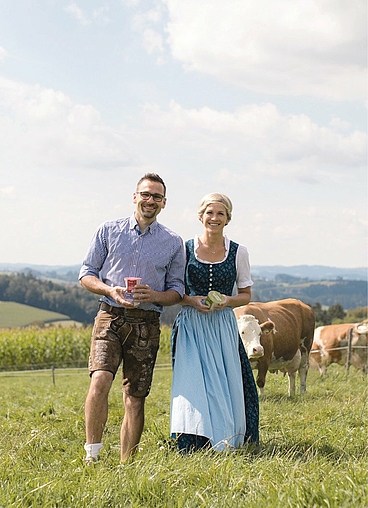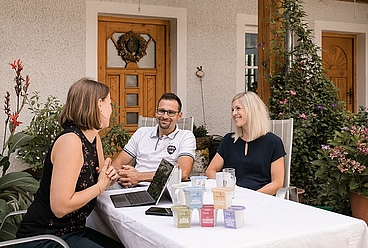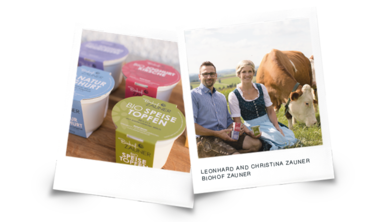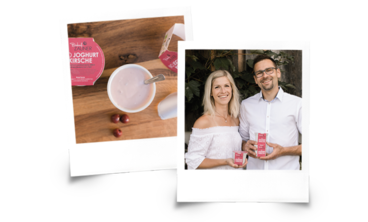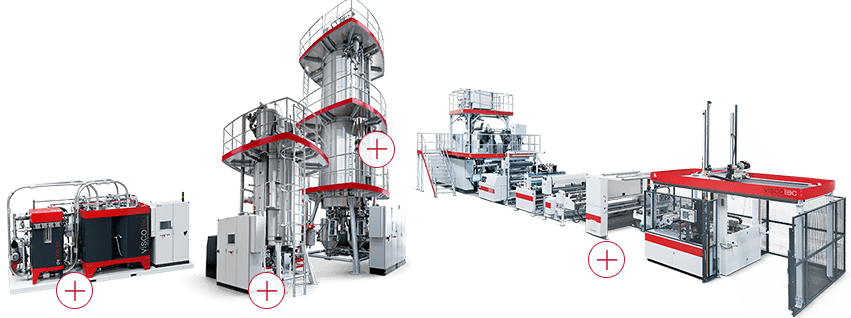Christina and Leonhard Zauner are Austrian farmers and producers of organic dairy products, who market their products under the brand ‘Biohof Zauner’. The couple simply wanted to pack yoghurts in the most sustainable way possible, and unexpectedly became pioneers of sustainable packaging. Julia Peherstorfer from viscotec visited Leonhard and Christina at their farm and asked them about their motives for this change and how their customers reacted to the new packaging.
Julia: You took over your family’s farm and dairy production one year ago. What motivates you to run this business?
Leonhard: We do not just want to increase quantities, but focus on higher quality. My parents have been producing organic dairy products for more than 25 years, and we wanted to introduce new products like fruit yoghurts.
Julia: Why did you search for new packaging?
Christina: We knew that we wanted and needed new packaging for the new products. In the past, we sold our yoghurts in glass containers. These are heavy and the washing is time-consuming and requires a lot of water and detergents. We went to trade fairs and evaluated the existing options, always asking ourselves “does this match with us?”, but could not find a truly sustainable packaging.
Julia: What were your requirements for the packaging?
Leonhard: It should be environmentally friendly, stable, and lightweight. We wanted it to be recyclable and ideally white because dairy products must be protected from UV light. Plus, we needed an attractive cup design that is suitable for curd as well as for yoghurts.
Julia: So, you ended up designing your own solution. Who supported you?
Leonhard: Only the dedication and support of many people made it possible. It was Starlinger viscotec who showed us the white rPET from 100% recycled material and encouraged us, to move forward with this new packaging concept. Markus Neudorfer from PETMAN in Austria is the sheet producer, who supplied us with the thermoformed trays. To really close the loop and get back the used packaging from our customers, we established a collection system together with the recycling centers and supermarkets in our region.
Julia: On the packaging of your yoghurt it is written „Our cup is made from 100% recycled PET because our environment is a priority for us.” Why is the 100% rPET cup the most sustainable option?
Christina: Our packaging is made from recycled material and it is designed for recycling. The customer first removes the cardboard banderole and peels off the seal made from aluminum. What remains, is the cup itself, which is not printed. rPET has a low carbon footprint during the product’s lifecycle from production to use. The main benefit is the possibility to upcycle the rPET cup after its use. PET can be recycled endlessly because the material’s mechanical properties are restored and it is cleaned to achieve food grade quality again. From cup to cup.
Julia: I imagine that many people perceive plastic negatively. How did your customers react, when you introduced the new packaging?
Leonhard: Yes, there were some surprised reactions at first. We were prepared to explain our packaging choice to our customers in person, on our webpage and via social media. It is important to provide objective information for the discussion. In my opinion, the carbon footprint is a holistic measure to evaluate the impact of products on our environment.
Christina: We are getting very good feedback. This is encouraging! Customers and supermarkets already ask, when we plan to change the few products sold in glass bottles to rPET packaging. For us, it was the right decision.
Julia: Thank you for sharing your vision and experience with me and viscotec’s partners and friends!
Designed for Recycling: 100% rPET dairy packaging




